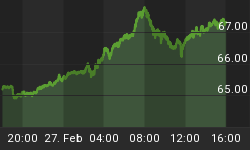One day after reversing recent trends, due to what appeared to be a sudden realization that something-could-still-go-wrong, markets were back in the reflation trade today. Stocks rallied back 1.1%. Volumes have been better of late, with share numbers above 1bln for the last week or so; clearly, there is money flow into the market. Where is it coming from? Well, just about anywhere... if you believe there is going to be lots of liquidity coming this way, and that there is a Bernanke put if it turns out you are wrong (in the sense that if the market plunges in disappointment the Fed will eventually ease anyway), then any asset is better than cash, stocks are better than fixed-income, and commodities better than stocks.
Please note that I said if. I have no doubt that the Fed is going to do QE2, but I have serious doubts that it will affect the money supply very much and I expect that the desire to take 2010 profits before 2011 income tax rates kick in will be on display for November and December. Equities, I fear, are setting themselves up for a fall.
One of the interesting QE2-trade-trends that resumed today was the dollar's weakness. Now, if the Fed is the only one doing quantitative easing, then surely an increase of the supply of dollars relative to yen, Euros, and pounds sterling will tend to drop the price of the greenback. That doesn't appear to be the case, however, and today in particular there was a stark reminder to that effect. To wit, the Monetary Policy Committee (MPC) of the Bank of England, while voting to keep monetary policy unchanged, made it clear that the members were leaning towards further monetization. From the minutes of the MPC, as reported in this story:
"Some of the members felt the likelihood that further monetary stimulus would become necessary in order to meet the inflation target in the medium term had increased in recent months."
Some analysts (and I am one of them, although I hasten to add that I am not qualified to be an MPC-watcher) feel that a movement to purchase more bonds could come in November, which of course would provide a certain synchronous harmony with the FOMC's move that is likely in the same month. I would not be terribly surprised to see the other major central banks follow suit as well, if only because they hold lots of dollars and probably would prefer it if the dollar didn't go into freefall for an easily-preventable reason. But despite this fairly-obvious offer to join the Fed's campaign to create more paper currency, Sterling beat the buck almost as badly as the Euro did. That doesn't seem to me to make a lot of sense.
There are many reasons to be negative on stocks, and for that matter bonds, here. Valuation is one of these. The declining transactional liquidity and widening spreads (although as I said equity volumes are doing better) is one. The fact that the Fed (through its managers Pimco and Blackrock) is suing a bank that they are also responsible for monitoring, in a surprising conflict of interest. An ebbing of momentum. Rotten political dynamics in terms of actually finding solutions (although gridlock is admittedly better than the recent policy of causing harm). Monetary policy that seems to be heading towards some acceptance of inflation greater than what has been tolerated in the past; as I'm fond of pointing out, equities tend to do poorly when inflation is either negative or above 2-3%. Bonds wouldn't do great in that scenario either.
If prices were lower, then some disappointment along any of these lines could be tolerated. It isn't clear to me that it can be tolerated with prices at the current level, so I expect the market to being sputtering soon (both bonds and stocks).
.
A quick announcement: the Kindle edition of my book is now available and I hope to soon have an iPad version out. Of course, you can still buy the real-paper version here.
.
Thursday's data includes Initial Claims (Consensus: 455k from 462k), Leading Indicators (Consensus: +0.3%), and the Philly Fed Index (Consensus: +2.0 from -0.7). Optimism springs eternal. The bounce last week in 'Claims is expected to be reversed, and the bounce last month in Philly Fed from -7.7 to -0.7 is expected to be extended. I don't see the reason for such optimism, although to be sure these would be pretty marginal improvements and probably not worth a pizza party. St. Louis Fed President Bullard is actually giving a press briefing specifically on monetary policy at 2pm ET; in the evening Hoenig is going to tell everyone why the Fed needs to start hiking rates when he expounds on the US Economic Outlook at a speech in Albuquerque. Finally, the Treasury will announce the size of the 5y TIPS reopening tomorrow.
At this point, I expect markets will hold serve for at least another week but may begin to lose steam as the Fed meeting approaches. I wouldn't be looking to ride the last 2%, though, and I don't see the potential for another 10%.















